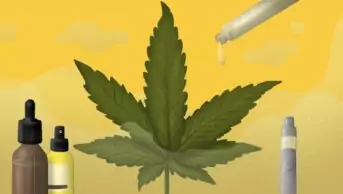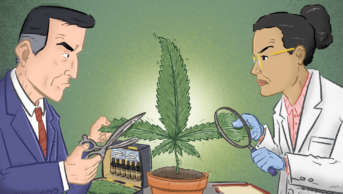
Shutterstock.com
Prescriptions for unlicensed cannabis-based products for medicinal use (CBPMs) more than doubled in England between 2021/2022 and 2022/2023, Care Quality Commission data have revealed.
A report from the CQC, the independent regulator of health and adult social care in England — ‘The safer management of controlled drugs: annual update 2023‘ — said that 177,566 items were prescribed between 1 July 2022 the 30 June 2023, compared with 81,476 items were dispensed in a community setting between 1 July 2021 and 30 June 2022.
“Almost all” of these items were dispensed in private clinics, the report said, adding that the number of CBPMs prescribed on the NHS was “so small that this could potentially breach patient confidentiality”.
Since 2018, when legislation changed to allow the prescribing of CBPMs, CQC said there had been “a significant increase in prescribing to treat a wide range of medical conditions, as well as changing models of care, including those involving non-medical prescribers”.
“People can also find it difficult to access joined-up care from all their healthcare providers,” the report said. “The number of unlicensed CBPMs prescribed each year continues to increase by at least 100% annually.”
“A multi-agency review of the impact of this change would be beneficial,” the report recommended.
Since medical cannabis was legalised, only three CBPMs have been approved for use, leading to concerns about the lack of NHS prescribing of CBPMs.
In February 2024, the National Institute for Health and Care Research, confirmed that were no ongoing government-backed trials of CBPMs.
At the time of the CQC report’s publication on 11 July 2024, there were 22 CQC-registered providers that prescribe unlicensed CBPMs in England.
Mike Barnes, founder of the Medical Cannabis Clinicians Society and Cannabis Industry Council, commented: “Awareness is slowly going up in the general population and there are now over 40 clinics and about 140 doctors meeting the increased demand.
“I should point out that the total prescriptions does not equate to total patient numbers, as doctors can only write prescriptions for one month and that quantity prescribed may just last the one month or sometimes longer if the product is ‘as required’.
“Thus, [there are] more prescriptions per annum than patients. Our best estimate of the total patient number is now about 45,000. That total is also slowly going up by about 1,000 per month.”
Barnes added that the low number of NHS prescriptions for unlicensed products “doesn’t surprise me as there is so much more the government could do”.
“We are hopeful that the new government may be more amenable to opening the NHS market than the last government.”
Wing Tang, head of professional standards at the Royal Pharmaceutical Society, said: “The Society would welcome a multi-agency review to assess whether the current system provides appropriate and equitable access to unlicensed CBMPs for both NHS and private patients in the exceptional cases where existing licensed medicines are inadequate.
“We would be glad to contribute to such a review.”


